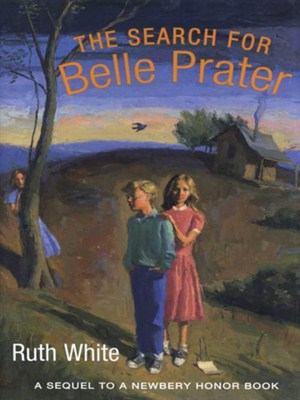[button color=”black” size=”big” link=”http://affiliates.abebooks.com/c/99844/77798/2029?u=http%3A%2F%2Fwww.abebooks.com%2Fservlet%2FSearchResults%3Fisbn%3D9780374308537″ target=”blank” ]Purchase here[/button]
In this companion to Belle Prater’s Boy, Gypsy and her cousin Woodrow do a little more growing-up in the small town of Coal Station, Virginia. It’s still the 1950s, when families like Gypsy’s are just getting their first TV set and, by running a wire up to a mountaintop antenna, they can pick up all of two networks. Black people are still (inexplicably) described as colored folks, barred from entering many businesses, and required to sit at the back of the bus. And more than anything else—even more than having the operation to straighten his crossed eyes—Woodrow wants to find out what became of his mother, the Belle Prater of the title, who disappeared one night and left him alone with his hard-drinking, good-for-nothing father.
Woodrow now lives next door to Gypsy with their grandparents. The two cousins are approaching high school age, and are beginning to take more adult responsibility. So when a mysterious phone call comes on New Year’s Eve—which happens to be Woodrow’s birthday—it seems inevitable that the two cousins will investigate it… even if it means riding a bus by themselves to a West Virginia town sixty miles away and exploring the unknown, outside world without adult supervision. It has to be done, if only to find the tiniest clue to what became of Belle Prater.
There are some tense and even eerie moments during Woodrow and Gypsy’s investigation; moments when their friendship feels strained; and period when Woodrow trades his usual high spirits for a depressed outlook that is normally unlike him. Besides their own search for clues in Bluefield, WV, the pair also helps a motherless black boy find the loving family he never knew he had. They visit the scene of Belle’s disappearance with a school friend who claims to have the sixth sense. And they make a strange discovery that will leave them, and perhaps you as well, wondering whether this is a simple coming-of-age story or a chilling tale of the paranormal.
But mostly it’s a touching example of the former, packed with salt-of-the-earth characters from the heyday and home region of bluegrass music. Not only the characters but at times even the narrator speak in a soft, backwoodsy dialect that may raise your English teacher’s disapproving eyebrow. The lead characters go right to your heart with their honesty, kindness, joke-telling sense of fun. Unique family customs, old-school social manners, and common-sense ways of getting by in a world without much of today’s flashy technology, add their respective layers of interest to what is basically a story about learning to accept and live with the unfairness and sadness in life—without losing hold of its joys.
Ruth White has been writing books since the 1970s, but it’s only since the turn of this century that she has really warmed up to it. Her titles, suggesting a special focus on childhood in the “mid-south” region of the US, include: Sweet Creek Holler; Tadpole; Buttermilk Hill; Way Down Deep; and A Month of Sundays. Visit Fantastic Fiction for more details.



